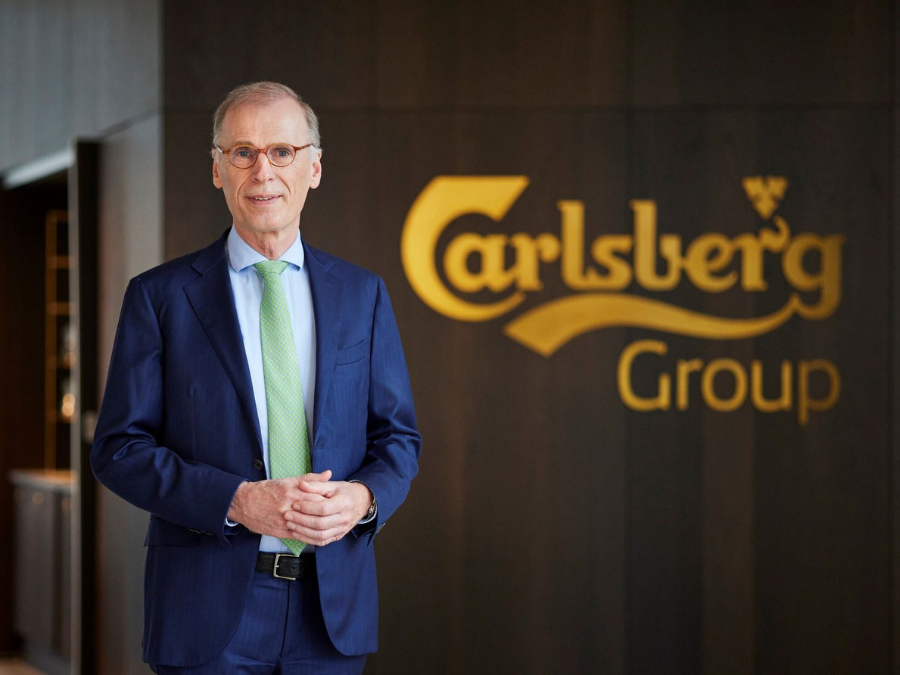
Carlsberg’s outgoing CEO Cees ‘t Hart is uncertain whether the brewer’s ‘premium’ beer stable in western Europe can bounce back in the second half of the year.
While global sales volumes of the Danish brewer’s premium portfolio rose in the first half of the year, it saw volumes in western Europe fall 2%.
Carlsberg said sales were affected by poor weather in the Nordics, as well as downtrading in Poland.
Speaking to Just Drinks after the company announced its half-year results yesterday (16 August), ‘t Hart said it was “difficult” to judge the impact of those factors on Carlsberg’s premium beer business in the region.
“It is difficult to say whether the price increases have muted volumes a bit, or that it’s the poor weather,” he said. “As you probably know yourself from the last couple of weeks, it was not great [weather] in Nordics and that means the on-premise is visited less. Normally, the on-premise caters for higher-value, premium beers. And that’s what we lacked.
“We need to see in a normal season whether there’s an impact of the weather, or if the impact is… due to higher prices and inflation on premium brands.”

US Tariffs are shifting - will you react or anticipate?
Don’t let policy changes catch you off guard. Stay proactive with real-time data and expert analysis.
By GlobalDataHe added: “What we see though in Poland is where consumer price inflation was roughly 20% and that’s where we see the pressure on the volume in the market.”
Asked if Carlsberg thinks it can grow its premium volumes in western Europe in 2023 as a whole, ‘t Hart said: “The second half will depend on whether we have an Indian summer or not. What we did was we improved our market share in the premium segment, so relatively we did well. However, as a segment, the total market was, in many markets, under pressure. We might not be positive at the end of the year in volume but that is more due to poor weather season than anything else.”
Carlsberg upbeat about China
In the opening six months of the year, Carlsberg grew total revenues by 6.6% to DKr37.79bn ($5.53bn). On an organic basis, the Tuborg brand owner’s revenue was up 11.2%. Volumes inched up 0.8% organically.
Organic revenue was up 9.2% in western Europe, grew by 16.3% in Carlsberg’s markets in central and eastern Europe and was 11.7% higher in Asia.
Volumes in western Europe fell 2.1% and were down 1.9% in central and eastern Europe.
However, volumes in Asia grew by almost 5%, with Carlsberg reporting “particularly good performance” from a clutch of four markets, including China. More than 20% of Carlsberg’s sales are generated in the country.
The brewer’s market share in China stands at 8%, compared to 6% in 2018, ‘t Hart said. Carlsberg’s “momentum” in the country means the 1664 Blanc owner thinks it can reach 10% “in the coming years”, he added.
“Our success over the last couple of years is ‘only’ moving from six to 8% and there’s no reason why we shouldn’t be able to move from eight to 10% in China,” ‘t Hart said.
“We have a broad portfolio of local premium and international premium brands. We are strong in big cities – and we can expand in these – but we are also in the west. And, especially in the west, you see now after Covid tourism [is] coming back and that helps support especially our local power brands. I’m very positive about the future of China.”
Asked if there were any concerns about consumer confidence in China, he added: “I would agree a bit more with you at the moment if we would have 60-70% market share, then you would become much more sensitive to the economy but, when your market share is relatively low, there are a lot of sources of growth.”
Reported operating profit fell 2.6% to DKr6.27bn. On an organic basis, operating profit was up 5.2%.
Carlsberg booked a profit for the period of DKr4.16bn, compared to a loss of DKr4.66bn in the first half of 2022.
On Tuesday, the Kronenbourg brewer upped its forecast for its annual organic operating profit.
Carlsberg is predicting growth of 4-7%, compared to an earlier forecast that ranged from a fall of 2% to an increase of 5%.
The Brooklyn Pilsner owner said in March ’t Hart was to step down as CEO by the end of the third quarter. Jacob Aarup-Andersen, who has been chief executive of facilities management company ISS for three years, will take the reins.
In a note to clients this morning, analysts at Barclays suggested Carlsberg’s guidance “may be conservative”.
“Good momentum in Europe, easy comps in China and cost tailwinds lead us to believe Carlsberg's FY23 guidance is very achievable,” they wrote.



